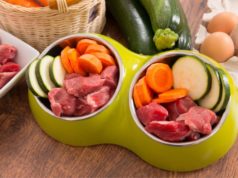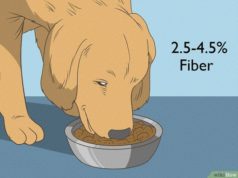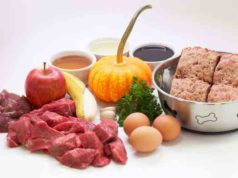Is a grain free diet good for dogs – Is a grain-free diet good for dogs? This question has become increasingly popular as pet owners seek healthier alternatives for their furry companions. While grain-free diets often promise improved digestion and reduced allergies, it’s crucial to understand both the potential benefits and drawbacks before making any dietary changes.
Grain-free diets exclude common grains like wheat, rice, and corn, often substituting them with ingredients like potatoes, legumes, and other alternative sources of carbohydrates and protein. The rationale behind this shift stems from the belief that grains can contribute to digestive issues, allergies, and other health problems in some dogs.
What are Grain-Free Diets?
Grain-free diets are a popular choice for dog owners seeking alternative feeding options for their furry companions. These diets, as the name suggests, exclude common grains often found in conventional dog food.
Common Grains Excluded
Grain-free diets typically exclude common grains such as:
- Wheat
- Corn
- Rice
- Soy
- Oats
- Barley
These grains are often included in traditional dog food formulas as affordable sources of carbohydrates and protein.
Rationale for Removing Grains
There are several reasons why some dog owners opt for grain-free diets:
- Allergies and Sensitivities: Some dogs may experience allergies or sensitivities to certain grains, leading to symptoms like skin irritation, digestive issues, and behavioral changes. Grain-free diets can help alleviate these symptoms by removing potential allergens from their diet.
- Digestive Health: Some proponents argue that grains can be difficult for dogs to digest, leading to digestive discomfort and malabsorption of nutrients. Grain-free diets, they claim, are easier for dogs to process and absorb.
- Nutritional Content: Grain-free diets often emphasize protein sources like meat, poultry, and fish, which are considered more natural and biologically appropriate for canine diets. These diets may also include alternative carbohydrate sources like sweet potatoes, peas, and lentils.
Benefits of Grain-Free Diets
Grain-free diets for dogs have gained popularity in recent years, driven by the belief that they offer various health benefits. While not a universal solution for every dog, grain-free diets can potentially address certain health concerns and improve overall well-being.
Improved Digestion
Grain-free diets often include ingredients that are easier for dogs to digest. This is because grains, especially wheat, corn, and soy, are common allergens and can cause digestive issues like gas, bloating, and diarrhea in some dogs. Grain-free alternatives, such as sweet potatoes, peas, and lentils, are typically more digestible and can help alleviate these symptoms.
Reduced Allergies
Food allergies are a common problem in dogs, and grains are among the most frequent culprits. Eliminating grains from a dog’s diet can significantly reduce the risk of allergic reactions, which can manifest as skin problems, digestive issues, and even respiratory problems.
Addressing Specific Health Concerns
Grain-free diets can be beneficial for dogs with certain health conditions. For instance, dogs with pancreatitis, a condition that affects the pancreas, may benefit from a low-fat, grain-free diet. Additionally, grain-free diets can be helpful for dogs with diabetes, as they often contain lower glycemic index ingredients that help regulate blood sugar levels.
Potential Drawbacks of Grain-Free Diets

While grain-free diets can offer some benefits for dogs, it’s crucial to be aware of potential drawbacks. Grain-free diets can sometimes lack essential nutrients, and certain ingredients can pose risks. Additionally, a link between grain-free diets and a serious heart condition has been established.
Nutritional Deficiencies
Grain-free diets can sometimes lead to nutritional deficiencies if not formulated carefully. Grains are a significant source of essential nutrients for dogs, including:
- Thiamin (vitamin B1): Essential for carbohydrate metabolism and nerve function.
- Riboflavin (vitamin B2): Important for energy production and cell growth.
- Niacin (vitamin B3): Plays a role in energy metabolism and DNA repair.
- Pantothenic acid (vitamin B5): Essential for hormone production and energy metabolism.
- Pyridoxine (vitamin B6): Crucial for protein metabolism and red blood cell formation.
- Biotin (vitamin B7): Important for healthy skin, hair, and nails.
- Folate (vitamin B9): Essential for cell division and growth.
- Cobalamin (vitamin B12): Crucial for nerve function and red blood cell formation.
- Iron: Essential for oxygen transport in the blood.
- Zinc: Important for immune function and wound healing.
- Manganese: Plays a role in bone formation and carbohydrate metabolism.
Grain-free diets often rely on alternative ingredients, which may not provide the same level of these nutrients. It’s essential to choose a high-quality grain-free diet that has been formulated to meet your dog’s specific nutritional needs.
Risks Associated with Certain Ingredients, Is a grain free diet good for dogs
Some ingredients commonly found in grain-free diets, such as legumes, can pose risks to dogs.
- Legumes: While legumes can be a good source of protein and fiber, they can also cause digestive issues in some dogs. Legumes contain a sugar called galactan, which can be difficult for some dogs to digest, leading to gas, bloating, and diarrhea. In addition, legumes can contain anti-nutrients, which can interfere with the absorption of certain nutrients.
It’s important to monitor your dog for any signs of digestive upset after switching to a grain-free diet. If you notice any issues, consult with your veterinarian.
Dilated Cardiomyopathy (DCM) and Grain-Free Diets
In recent years, a link has been established between grain-free diets and dilated cardiomyopathy (DCM), a serious heart condition in dogs. DCM is a disease of the heart muscle that causes it to weaken and enlarge, making it difficult for the heart to pump blood effectively. While the exact cause of DCM in dogs is unknown, research suggests that certain ingredients in grain-free diets, particularly legumes, may play a role.
The FDA has investigated reports of DCM in dogs eating grain-free diets and found that a significant percentage of these diets contained peas, lentils, and/or chickpeas.
The FDA recommends that dog owners consult with their veterinarian about the potential risks and benefits of grain-free diets, especially for dogs with a history of heart disease.
Grain-Free Diet Considerations
Deciding whether a grain-free diet is right for your dog involves careful consideration of various factors. While these diets offer potential benefits, it’s crucial to weigh the pros and cons and make an informed decision based on your dog’s individual needs and health status.
Consulting a Veterinarian
Before transitioning your dog to a grain-free diet, consulting a veterinarian is paramount. Your veterinarian can assess your dog’s overall health, identify any potential allergies or sensitivities, and recommend the most appropriate diet based on their specific needs.
“It’s essential to have a conversation with your veterinarian before making any significant changes to your dog’s diet.”
They can also help you choose a high-quality grain-free food that meets your dog’s nutritional requirements and ensure the transition is smooth.
Alternatives to Grain-Free Diets: Is A Grain Free Diet Good For Dogs
While grain-free diets have gained popularity, they’re not the only solution for dogs with sensitivities or allergies. Several other dietary approaches can effectively address these issues, offering a range of options for pet owners.
Limited Ingredient Diets
Limited ingredient diets are specifically designed for dogs with food sensitivities or allergies. They contain a minimal number of ingredients, often featuring a single protein source and a single carbohydrate source. This helps identify potential allergens and provides a controlled dietary environment for managing sensitivities.
- Benefits:
- Simplifies identifying allergens.
- Reduces the risk of triggering reactions.
- Provides a controlled dietary environment.
- Examples:
- Diets featuring salmon and sweet potato.
- Diets with lamb and brown rice.
- Diets with duck and peas.
Hypoallergenic Diets
Hypoallergenic diets are formulated to minimize the risk of allergic reactions. These diets typically use hydrolyzed protein sources, which are broken down into smaller molecules that are less likely to trigger an immune response.
- Benefits:
- Reduces the likelihood of allergic reactions.
- Suitable for dogs with severe food allergies.
- Examples:
- Hydrolyzed chicken protein diets.
- Hydrolyzed salmon protein diets.
Final Review
Choosing the right diet for your dog is a personal decision that requires careful consideration. While grain-free diets can offer benefits for certain dogs, they also carry potential risks. Consulting with a veterinarian is essential to determine if a grain-free diet is appropriate for your pet, considering their individual needs and health history. Remember, a balanced and nutritious diet, tailored to your dog’s specific requirements, is the key to their overall well-being.
Answers to Common Questions
What are some signs that my dog might be sensitive to grains?
Common signs of grain sensitivity in dogs include digestive issues like diarrhea, vomiting, gas, and itchy skin.
Are all grain-free diets the same?
No, grain-free diets vary significantly in their ingredients and nutritional content. It’s crucial to choose a high-quality diet formulated to meet your dog’s specific needs.
Can I switch my dog to a grain-free diet without consulting a vet?
It’s highly recommended to consult with your veterinarian before making any significant dietary changes for your dog. They can assess your dog’s individual needs and recommend the best diet for their health.
Whether a grain-free diet is beneficial for your dog is a question best answered by your veterinarian. They can help determine if your furry friend needs a specialized diet. While you’re figuring that out, you might want to tackle a different kind of cleaning project: your grout.
If your bathroom tile is looking a little less than pristine, check out how to clean dirty grout for some helpful tips. Once your grout is sparkling, you can focus on getting your dog the right nutrition for a healthy, happy life.
While a grain-free diet can be beneficial for some dogs, it’s crucial to understand that it’s not a one-size-fits-all solution. For example, if your dog has diabetes, you might want to explore dietary changes that focus on managing blood sugar levels, like those outlined in this guide on how to reverse diabetes with diet.
Ultimately, the best diet for your dog depends on their individual needs and health conditions. Consulting with a veterinarian is always recommended to determine the most appropriate diet for your furry friend.
Grain-free diets have become popular for dogs, but it’s important to understand the potential benefits and drawbacks. Some people believe that a grain-free diet can improve digestion and reduce allergies. However, others argue that it might not be necessary for all dogs and could even lead to health issues.
If you’re considering a raw diet for your dog, you might want to check out this article on is a raw diet good for dogs. Ultimately, the best diet for your dog will depend on their individual needs and preferences.























